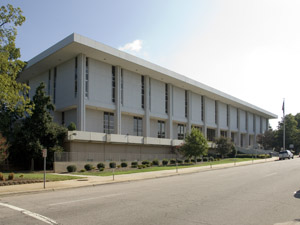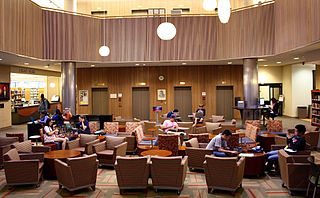Related Research Articles
Interlibrary loan is a service where patrons of one library can borrow materials and receive photocopies of documents that are owned by another library. The user makes a request with a library, which identifies libraries with the desired item, places the request, receives the item, gives it to the user, and arranges for its return. In some cases, fees accompany interlibrary loan services.
The California Digital Library (CDL) was founded by the University of California in 1997. Under the leadership of then UC President Richard C. Atkinson, the CDL's original mission was to forge a better system for scholarly information management and improved support for teaching and research. In collaboration with the ten University of California Libraries and other partners, CDL assembled one of the world's largest digital research libraries. CDL facilitates the licensing of online materials and develops shared services used throughout the UC system. Building on the foundations of the Melvyl Catalog, CDL has developed one of the largest online library catalogs in the country and works in partnership with the UC campuses to bring the treasures of California's libraries, museums, and cultural heritage organizations to the world. CDL continues to explore how services such as digital curation, scholarly publishing, archiving and preservation support research throughout the information lifecycle.

Ann Shumelda Okerson is an American librarian and expert on the place of new digital technologies in libraries.
The International Coalition of Library Consortia (ICOLC) is an informal, self-organized group of library consortia from around the world; it exists for strategic and practical discussion of issues of common interest among the consortia members. The ICOLC first met informally as the Consortium of Consortia (COC) in 1997. Over time, its name was adjusted to reflect its increasingly global character.

The State Library of North Carolina is an institution which serves North Carolina libraries, state government employees, genealogists, and the citizens of North Carolina. The library is the main depository for North Carolina state publications and serves the needs of North Carolina government agencies and state government employees by providing access to information resources that are vital to public decision-making and economic development.
The Ohio Library and Information Network (OhioLINK) is a consortium of Ohio's college and university libraries and the State Library of Ohio. Serving more than 800,000 students, faculty, and staff at 88 institutions with 117 libraries, OhioLINK's membership includes 16 public universities, 23 community/technical colleges, 48 private colleges and the State Library of Ohio. OhioLINK serves faculty, students, staff and other researchers via campus-based integrated library systems, the OhioLINK central site, and Internet resources.

The Connecticut State Library is the state library for the U.S. state of Connecticut and is also an executive branch agency of the state. It is located in Hartford, Connecticut directly across the street from the Connecticut State Capitol. The State Library provides a variety of library, information, archival, public records, museum, and administrative services to the citizens of Connecticut, as well as the employees and officials of all three branches of state government. Students, researchers, public libraries and town governments throughout the state are also served by the State Library. In addition, the State Library directs a program of statewide library development and administers the Library Services Technology Act state grant. "The mission of the Connecticut State Library is to preserve and make accessible Connecticut's history and heritage and to advance the development of library services statewide."
The Idaho Commission for Libraries (ICFL), formerly the Idaho State Library, assists libraries in Idaho to build the capacity to better serve their clientele.
The Center for Research Libraries is a consortium of North American universities, colleges, and independent research libraries, based on a buy-in concept for membership of the consortia. The consortium acquires and preserves traditional and digital resources for research and teaching and makes them available to member institutions through interlibrary loan and electronic delivery. It also gathers and analyzes data pertaining to the preservation of physical and digital resources, and fosters the sharing of expertise, in order to assist member libraries in maintaining their collections. The Center for Research Libraries was founded in 1949, as the Midwest Inter-Library Center (MILC). The traditional role of CRL was as an aggregator of tangible collection materials, however this has been updated in the digital age into the CRL's current role as a facilitator of collection development, digitization, and licensing collections by individual libraries and interest groups. This transformation required CRL to adopt new funding models from partnerships with key organizations, and an updated use of current technology to support community outreach and engagement. The funding was provided by the Andrew W. Mellon Foundation, the National Science Foundation, and the IMLS.

The Nebraska Library Commission is a Nebraska state government agency. Located in Lincoln, the Library Commission provides reference, resources, training, and consulting for all types of library in the state. The various collections housed at the Library Commission are used to serve librarians, state employees, seekers of government information, and visually handicapped Nebraskans. The Library Commission is a clearinghouse for state government publications and makes many documents accessible online.
The Alberta Library (TAL) is a not-for-profit library consortium consisting of 50 member libraries and library systems in over 300 locations in the Canadian province of Alberta. Members include public, post-secondary, government and special libraries. It was created in 1997.
The Kentucky Council on Postsecondary Education coordinates change and improvement in Kentucky's postsecondary education system as directed by the Kentucky Postsecondary Education Improvement Act of 1997. The Council is a statewide coordinating agency with 16 members: 14 citizens, one faculty member and one student appointed by the Governor; the Commissioner of Education is an ex officio member.

The State Library of Iowa is a library service in the American state of Iowa. Founded around 1840, it is based in Des Moines and is run by the Iowa Department of Education. The State Library supports local libraries in the state and itself acts as a resource for the state government and its citizens and is funded from local taxation.
A library consortium is any cooperative association of libraries that coordinates resources and/or activities on behalf of its members, whether they are school, public, academic, special libraries and/or information centers. Consortia exist on a variety of levels, e.g., local, state, regional, national or international. Libraries commonly belong to multiple consortia. The goal of a library consortium is to amplify the capabilities and effectiveness of its member libraries through collective action, including, but not limited to, print or electronic resource sharing, reductions in costs through group purchases of resources, and professional development opportunities. The “bedrock principle upon which consortia operate is that libraries can accomplish more together than alone.”
The law of Texas is derived from the Constitution of Texas and consists of several levels, including constitutional, statutory, and regulatory law, as well as case law and local laws and regulations.

Common Language Resources and Technology Infrastructure (CLARIN) is a distributed digital infrastructure, with participating institutes all over Europe, such as universities, research centres, libraries and public archives. The participating organizations have in common that they provide access to digital language data collections, to digital tools, and training material for researchers to work with the resources.

The University of Texas at San Antonio Libraries is the academic library of The University of Texas at San Antonio, a state research university in San Antonio, Texas, United States. UTSA Libraries consists of the John Peace Library (JPL) on the Main Campus, the Downtown Library, and the Applied Engineering and Technology (AET) Library. The libraries provide students and faculty with a comprehensive access to information as well as spaces for active learning, teaching, and interdisciplinary scholarship.
The Boston Library Consortium (BLC) is a library consortium based in the Boston area with 23 member institutions across New England.

In Montana, TRAILS is a statewide consortium of academic libraries which includes all 23 of Montana's public, private and tribal community colleges and universities. TRAILS serves over 49,500 students, faculty, researchers and community members, providing access to over 4,000,000 library items. The consortium is expected to save seven million dollars over a five-year period. TRAILS maximizes the return on resource investment, enhances teaching and research, improves the user experience, and encourages shared expertise among members of institutions across the state.
References
- TexShare official web site retrieved August 30, 2019
- TexShare Overview retrieved August 30, 2019
- TexShare core database descriptions retrieved August 30, 2019
- Coalition of Library Consortia member list retrieved August 30, 2019